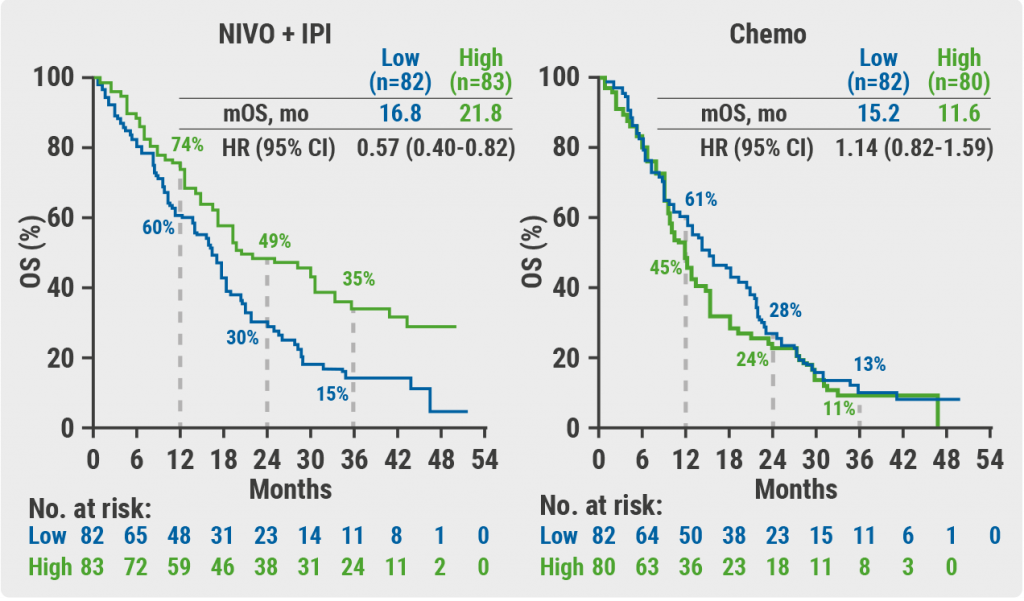In the randomised, phase 3 CheckMate743 trial (NCT02899299), first-line nivolumab plus ipilimumab significantly improved overall survival (OS) over chemotherapy in patients with unresectable MPM (18.1 vs 14.1 months; HR 0.74; P=0.0020) [1]. This regimen is now approved in EU & USA, amongst others, as first-line treatment for (adult) patients with unresectable MPM. However, no long-term outcomes of immunotherapy in MPM had been reported. Prof. Solange Peters (Lausanne University Hospital, Switzerland) presented the 3-year update of efficacy and safety results from CheckMate743 as well as results from exploratory biomarker analyses.
The study enrolled 606 patients with untreated MPM, stratified by histology (epithelioid vs non-epithelioid) and sex. Patients were randomised 1:1 to nivolumab (3 mg/kg every 2 weeks)/ipilimumab (1 mg/kg every 6 weeks) up to a maximum of 2 years or to chemotherapy (every 3 weeks, 6 cycles). The primary endpoint was OS, safety and biomarker assessments were prespecified exploratory endpoints. OS association with a 4-gene inflammatory gene expression signature (CD8A, PD-L1, STAT-1, LAG-3) was estimated by RNA sequencing and categorised as high versus low relative to median score.
With a minimum follow-up of 35.5 months, nivolumab/ipilimumab continued to provide OS benefit versus chemotherapy (HR 0.73). OS rates were 41% versus 27% at 24 months and 23% versus 15% at 36 months. Progression-free survival (PFS) rates at 36 months were 14% versus 1%. Of note, treatment with nivolumab/ipilimumab stopped at a maximum of 24 months. OS rates in the nivolumab/ipilimumab-treated population were irrespective of histology. Median duration of response was 11.6 months for nivolumab/ipilimumab versus 6.7 months for chemotherapy. In a post hoc analysis, discontinuation of nivolumab/ipilimumab due to treatment-related adverse events did not have a negative impact on the long-term benefits seen in all randomised patients.
Exploratory biomarker analyses showed that median OS was longer for patients with high inflammatory gene signature score (21.8 months vs 16.8 months for low inflammatory gene signature score) in the nivolumab/ipilimumab-treated population. At 3 years, 35% of nivolumab/ipilimumab-treated patients with a high inflammatory gene signature score were still alive versus 15% of patients with a low score. The inflammatory gene signature score was not associated with prolonged OS for chemotherapy (see Figure).
Figure: OS by 4-gene inflammatory signature score [2]

“These updated data further reinforce previously published findings and support the benefit of giving patients immunotherapy instead of chemotherapy,” concluded Prof. Peters.
- Baas P, et al. Lancet 2021;397:375-386.
- Peters S, et al. First-line nivolumab (NIVO) plus ipilimumab (IPI) vs chemotherapy (chemo) in patients (pts) with unresectable malignant pleural mesothelioma (MPM): 3-year update from CheckMate743. Abstract LBA65, ESMO Congress 2021, 16–21 September.
Copyright ©2021 Medicom Medical Publishers
Posted on
Previous Article
« Adjuvant atezolizumab lowers relapse rate in resected NSCLC Next Article
Robust anticancer activity of trastuzumab deruxtecan in HER2-mutated NSCLC »
« Adjuvant atezolizumab lowers relapse rate in resected NSCLC Next Article
Robust anticancer activity of trastuzumab deruxtecan in HER2-mutated NSCLC »
Table of Contents: ESMO 2021
Featured articles
Breast Cancer
Trastuzumab deruxtecan triples PFS
Novel conjugate meets primary endpoint
Longest survival benefit from first-line CDK4/6 inhibitor
Meta-analysis shows 6-months adjuvant trastuzumab is optimal
Double-positive results for triple-negative metastatic breast cancer
Survival after neoadjuvant therapy with trastuzumab-lapatinib plus chemotherapy
Postmenopausal breast cancer: extended letrozole reduces recurrence
Asian women also benefit from palbociclib plus letrozole
No PEARLs of survival with palbociclib plus endocrine therapy compared with capecitabine, but QoL better
Gastrointestinal Cancer
Neoadjuvant chemotherapy potential alternative to neoadjuvant chemoradiotherapy in LARC
Immune chemo-sensitisation looks promising in microsatellite-stable mCRC
Adagrasib shows promising clinical activity in heavily pretreated KRAS-mutated CRC
Automated detection of microsatellite status on unstained samples in early colon cancer
Consistent benefit of anti-PD-1 therapy for oesophageal and gastric cancer
HIPEC in gastric cancer with peritoneal metastases
ctDNA highly predictive in HER2-positive, advanced gastric or gastro-oesophageal junction cancer
Lung Cancer
Robust anticancer activity of trastuzumab deruxtecan in HER2-mutated NSCLC
Nivolumab/ipilimumab continues to provide survival benefit in unresectable MPM
Adjuvant atezolizumab lowers relapse rate in resected NSCLC
Three-year OS follow-up from CASPIAN trial
TCR clonality predicts pembrolizumab response in NSCLC
Melanoma
Adjuvant immunotherapy reduces risk of disease recurrence in stage II melanoma
IFN-γ signature predicts response to immunotherapy
Updated results of SECOMBIT trial
Combining T-VEC and pembrolizumab does not significantly improve survival in advanced, unresectable melanoma
Durable intracranial responses with nivolumab/ipilimumab
Genitourinary Cancer
TKI drug-free interval strategy not detrimental to conventional continuation strategy in RCC
Modified ipilimumab schedule reduces risk of grade 3/4 adverse events
Optimal neoadjuvant dose ipilimumab/nivolumab in stage III urothelial cancer
Better survival with neoadjuvant dose-dense MVAC regimen in MIBC
PARP inhibitor rechallenge improves PFS in ovarian cancer
Pembrolizumab prolongs survival in persistent, recurrent, or metastatic cervical cancer
Pembrolizumab has durable effect in previously treated MSI-H/dMMR advanced endometrial cancer
HRR mutational status is prognostic and predictive biomarker olaparib activity
Haematological Cancer
Mutational analyses are predictive in malignant lymphomas
Low numbers of M2 macrophages in tumour microenvironment associated with superior response to immunotherapy in Hodgkin lymphoma
COVID-19
Adequate response to SARS-CoV-2 vaccine in cancer patients
Cancer patients more likely to die from COVID-19 when hospital admittance is required
Third global survey of the ESMO Resilience Task Force
High COVID-19 mortality in Swiss cancer patients
Basic Science & Translational Research
Neutrophils negatively correlate with response to anti-PD-1 monotherapy in dMMR tumours
Tetraspecific ANKETs harnesses innate immunity in cancer therapies
Early ctDNA reduction in metastatic uveal melanoma correlates better with OS than RECIST response
Gut microbiota as a potential predictive biomarker
Related Articles
November 19, 2021
Modified ipilimumab schedule reduces risk of grade 3/4 adverse events

© 2024 Medicom Medical Publishers. All rights reserved. Terms and Conditions | Privacy Policy

